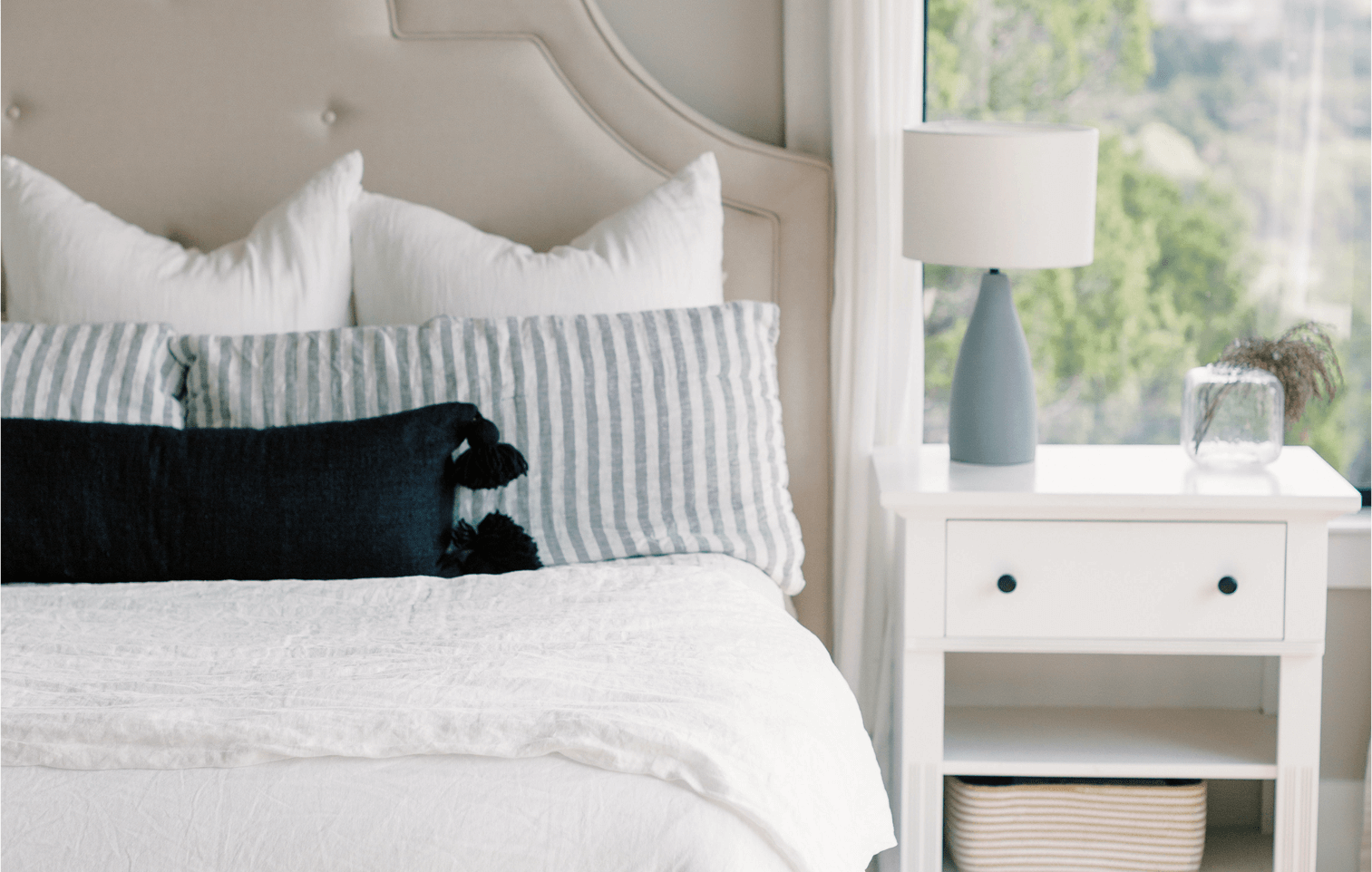The Ultimate Bedroom Cleaning Checklist

Benjamin Franklin once said, “Early to bed and early to rise makes a man healthy, wealthy and wise.” But a restful night’s sleep isn’t just about when you go to bed, it’s also about the environment you sleep in.
Research shows that a clean, clutter-free bedroom can improve quality of sleep,[1] air quality, and overall well-being.[2]
One study[3] found that clutter alone can interfere with self-motivation, negatively impacting mood and social abilities. And in a recent study in China,[4] residents reported better health when their homes were clean and tidy.
The solution? Use gentle, human-safe cleaning products and stick to a consistent cleaning schedule.
By doing so, you can reduce allergens, eliminate dust, and create a healthier, more restful space.
Bedroom Cleaning Tasks
To help make cleaning your bedroom less daunting, we’ve put together the ultimate bedroom cleaning checklist to help you create a safe and healthy sleeping space.
First, we’ll cover a few regular cleaning tasks. Then, we’ll share our daily, weekly, monthly, and bi-annual bedroom cleaning checklists for a deeper, more detailed clean.
Tidy Any Clutter
A tidy bedroom is a healthy bedroom.
In fact, the National Eye Institute[5] studied the effect of ‘visual clutter’ and how it alters information flow in the brain.
The results: too much stuff lying around can negatively affect the brain’s ability to process information.
Studies have also shown how household clutter negatively affects mood and mental health.[6] But there’s a solution! Tidy the clutter. Here’s how:
Spend about 5 to 10 minutes a day doing a quick pickup of items that don’t belong in the bedroom. Restore all mislaid items to their rightful place.
To help maintain a tidy bedroom, try implementing one or two of the following:
- Use baskets or trinket trays to hold loose items like jewelry, keys, and coins.
- Add a small trash can to your bedroom to collect trash in.
- Use a basket to place clutter in each day. At the end of the day, take all items to their designated homes.
- Only keep regular-use items out, like glasses and keys.
- Declutter once a month. Any unused or unwanted items lying around, donate or trash them.
Wash Bedding
Whether you’re sleeping or relaxing, science shows you’ll spend at least one-third of your life in bed.[7]
During sleep, your body naturally heals and rejuvenates by sweating and shedding dead skin cells. While this detoxification process is important for your health, it also causes bedding, especially pillowcases,[8] to quickly accumulate dead skin cells, bodily fluids, germs, and bacteria.
To support a healthy and safe sleeping space, opt for natural, non-toxic bedding and wash it at least once a week using a fragrance-free, human-safe laundry detergent.
Here’s how to wash bedding using Branch Basics or your favorite natural laundry detergent:
Strip the bed of all bedding. Set the comforter, quilts, blankets, and decorative pillows aside - you only need to wash these items once a month.
Wash sheets, pillowcases, protective pillow covers, and (if you have one) duvet covers with a natural, human-safe detergent like Branch Basics Laundry Detergent.
Once everything is dry, make the bed.
Dust Surfaces
Dust is one of the leading causes of indoor air pollution.[8] It acts as a magnet, attracting a variety of pollutants including heavy metals, SVOCs, and other biological contaminants that are harmful to your health.
Because of this, regular dustings are important, especially if you or someone in your home has allergies or skin sensitivities.
To dust, lightly spray a microfiber cloth with Branch Basics All Purpose.
Work from top to bottom, wiping down ceiling fans, walls, decor, and baseboards. Next, dust all flat surfaces like nightstands, tops of dressers, tables, and windowsills.
And don’t forget lampshades, TVs, trinket boxes, books, and indoor plant leaves.
Vacuum And Mop Floors
Bedroom floors need a lot of cleaning, especially in high traffic rooms, or homes with children and/or pets.
Start by removing and vacuuming any rugs. Then, use a HEPA vacuum to clean the floors, including under the bed, heavy furniture, and along the baseboards.
For hard-surface floors, mop with Branch Basics Concentrate, or another natural floor cleaner.
For accurate dilution instructions, see How to Clean Floors with Branch Basics.
Clean Windows And Mirrors
Clean the bedroom windows and mirrors with Streak-Free and a microfiber towel at least once a month. For a step-by-step guide and best practices, check out How to Clean Windows Naturally.
Note: Avoid using ammonia-based window cleaners. Not only are they super toxic, they’re not effective.
Learn more in The 6 Best Glass Cleaners Without Ammonia.
Deodorize The Room
Now that your bedroom is clean, the last step is to deodorize the room and eliminate any lingering odors.
Here are a few natural ways to deodorize your bedroom:
- Open the windows for at least 10 to 15 minutes to let fresh air in.
- Burn a human-safe beeswax candle. Our Branch Basics Beeswax Candle is made with 100% pure beeswax, an organic cotton wick, and is completely free of synthetic fragrances and essential oils.
- If your bedroom has carpet, sprinkle baking soda around and let dwell for at least 20 minutes to several hours, then vacuum. The baking soda will naturally absorb any musty odors.
For more natural ways to deodorize the bedroom, check out 7 Non-Toxic Air Fresheners & How To Remove Odors Naturally.
Daily Bedroom Cleaning
Set aside just 15 to 20 minutes each day to complete a few bedroom cleaning tasks. A simple routine, like the one below, will help keep your room looking and feeling clean.
Here’s a daily bedroom cleaning checklist for keeping your bedroom tidy:
- Tidy up and remove clutter.
- Make the bed.
- Put dirty clothes in the laundry room.
- Put away clean clothes.
These checklists are all about creating and sticking to a routine. Learn more about habit-stacking, and other tips and tricks in 5 Cleaning Hacks to Keep You Sane (No Matter How Crazy Life Gets).
Weekly Cleaning
Choose one day each week to focus on deeper cleaning tasks. An extra 30 to 45 minutes is all it should take to check these off your list.
Here’s our weekly bedroom cleaning checklist for a deeper clean:
- Strip and wash bedding with Branch Basics Laundry Detergent, including the sheets, pillowcases, and duvet covers (if applicable).
- Make the bed with clean, natural bedding.
- Check out our Quick Guide to Natural, Non-Toxic Bedding for vetted options.
- Check out our Quick Guide to Natural, Non-Toxic Bedding for vetted options.
- Dust all furniture.
- Clean mirrors, windows, and dust window sills.
- Wipe down door handles and light switches.
-
HEPA vacuum or sweep floors and rugs. Mop hardwood floors.
- Take out trash.
Monthly Cleaning
For tasks that don’t require daily or weekly attention, set aside some time once a month to complete. In about an hour, you should be able to knock out this monthly bedroom cleaning checklist:
- Dust ceiling fans, light fixtures, lampshades, TVs, vent covers, picture frames, and indoor plant leaves.
-
Deep clean ceilings, walls, and baseboards.
- Wash curtains & deep clean blinds.
- Wash comforters, blankets, shams and decorative pillows.
- Dust the headboard and the bedframe.
- Move all furniture to deep clean underneath. Dust the underneath, legs, and vacuum the floor.
- Declutter, organize, and dust the closet and hanging rods.
Bi-Annual Cleaning
Although they aren’t as noticeable, the tasks on our bi-annual bedroom cleaning checklist make a big difference in maintaining a fresh and healthy bedroom.
Twice a year, set aside a few hours to complete the following:
- Remove all bedding to check and treat the mattress for sweat stains.
- HEPA vacuum the mattress, then flip and make the bed.
- Declutter and organize all shelves and drawers.
- Check for and remove stains on rugs, carpets, and soft furniture. Deep clean all.
- Clean or replace air purifier, humidifier, and air conditioner filters.
Healthier Bedrooms With Branch Basics
Creating and maintaining a clean bedroom is important for many reasons. It provides you and your family with better sleep, improved air quality, and reduced stress and anxiety, just to name a few.
The cleaning process is simple, especially when you follow a bedroom cleaning checklist like the one we’ve shared with you here.
For a healthier bedroom, consider cleaning with Branch Basics.
To get started, check out our Branch Basics Premium Starter Kits (available in refillable plastic or glass). Each Starter Kit comes with our all-in-one Concentrate, a full bag of Oxygen Boost, and five reusable spray bottles to make your own All-Purpose, Bathroom, Streak-Free, Laundry, and Foaming Wash.
Looking for more natural cleaning tips for the whole house?
Check out Our Ultimate Spring Cleaning Guide and our Ultimate Kitchen Cleaning Checklist for more how-tos and human-safe deep cleaning methods!
References Mentioned In This Article:
-
https://pmc.ncbi.nlm.nih.gov/articles/PMC9616259/
-
https://pmc.ncbi.nlm.nih.gov/articles/PMC9736414/
-
https://link.springer.com/article/10.1007/s12144-017-9682-9#citeas
-
https://pmc.ncbi.nlm.nih.gov/articles/PMC8431523/
-
https://www.nei.nih.gov/about/news-and-events/news/visual-clutter-alters-information-flow-brain
-
https://www.apa.org/news/podcasts/speaking-of-psychology/clutter
-
https://pubmed.ncbi.nlm.nih.gov/21056174/
-
https://pmc.ncbi.nlm.nih.gov/articles/PMC7434492/
Categories

Marilee Nelson
Marilee Nelson is an Environmental Toxins expert who has spent nearly 30 years advocating for the chemically-sensitive and chronically-ill. She is a Board Certified Nutritionist, Certified Bau-Biologist and Bau-Biology Inspector and specializes in Food As Medicine. She has helped thousands of families and individuals identify, heal and recover from toxic exposures and is on a mission to revolutionize the way American families view their health.






